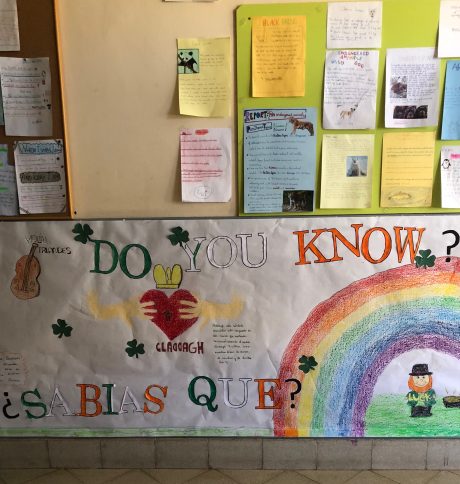By Andrea S., Auxiliar de Conversación in Murcia 18/19.
Before applying for an Auxiliar de Conversación position in Spain the big question I had was: do you need to know Spanish to teach English in Spain? Which, in my opinion, is a completely reasonable question, especially for those venturing into new waters. What I have learned is that the work of an Auxiliar de Conversación does not necessarily require a Spanish background! In fact, when it comes to teaching, it may work to your advantage if you do not have any Spanish background.
You are reduced to only speaking English and this kind of exposure is beneficial to the students. If students get the impression that you can speak Spanish, they may default to their native language. This can be confusing for them and detract from fully immersing themselves in the English language. So, if you have limited (to no) knowledge of the Spanish language, you are exactly where you need to be. For me, the fact I did not have to be fluent in Spanish is what permitted me to apply to the program. In my past efforts to teach in Spain, there was a requirement to know a certain amount of Spanish. Fortunately, this is not the case as an Auxiliar. Now I’m getting the experience that I wanted and I’m loving it!
What Happens out of Class?
However, as an Auxiliar de Conversación there will be a world outside the classroom that will most certainly speak Spanish. It is Spain after all! English speakers may be scarce depending on location, so it may be nice to review some Spanish vernacular to avoid potential culture shock. It can be overwhelming at times to transition from an English-speaking environment to a Spanish-speaking environment. Knowing a bit beforehand may alleviate some stress. This may even serve as an aid to get by when traveling to your assigned destination, coordinating daily basic needs and building relationships within your community.
Upon initial arrival, there are documents that an Auxiliar needs to complete (for example your T.I.E) that may be difficult to translate without some basic knowledge of the language. I have also come to find that Spaniards are very friendly and inquisitive people (not all, but most) and may get excited to get to know you. However, not all of them speak English fluently so this may impose a challenge or a barrier to building connections.
Having some helpful apps on hand (like Spanish dictionary or Google translate) can be lifesavers while initially integrating into a new culture. Even still, I have found locals to be hospitable regardless of my ability to speak Spanish. Many moments come to mind where I needed help and complete strangers were generous to provide assistance despite my poor Spanish skills. I am a big believer that kindness transcends the language barriers that may be present.
Learning Spanish
For individuals who want to learn Spanish there will be ample opportunities to do so. Depending on where assistants are located, there may be opportunity for Spanish classes or one-on-one interactions that will provide more exposure and practice with the language. I have learned in my time living in Spain that the language becomes more familiar the more you participate and interact with your environment (i.e. teachers, student’s parents, landlords, etc).
In my experience, I have learned the most Spanish when I converse with other teachers over coffee or on a walk. The best way to learn (in my opinion) is to be immersed in the language and practice the vocabulary whenever opportunities present themselves. Otherwise, as creatures of habit, we have a tendency to revert back to what is comfortable and what we know.
All that to say, this validates the point made earlier of the importance of only speaking English to the students. Immersion in Spanish accelerates understanding of the language and your students will have the same experience with English. The impulse to speak Spanish in the classroom may grow stronger as you become more comfortable with it. My recommendation is to be aware of where you are and what language is appropriate in that setting. It can be a challenge, but it keeps you alert and your brain active!
There have been cases where I have felt knowing Spanish may help when directing and giving instructions to the students. It is encouraged to utilize my surrounding resources, including other faculty. The teachers I am paired with have been very helpful when I found I was at a loss for words. They were also very supportive when my students didn’t fully grasp the concepts or instructions.
Live the Experience!
All an all, I hope to encourage anyone who may be on the fence about taking this opportunity due to limited Spanish background. Do not let this hold you back! Transitioning into a new culture and language will impose challenges and may be overwhelming regardless, but persevering through these difficulties will only build confidence, and provide even greater rewards in the end. It is best to go in knowing you have all the tools you need just by knowing English. Anything else you may need help with, you will certainly have access to support. My advice. Say yes. Go for it. Jump in!









2 Responses
Thank you for sharing, sweet article!